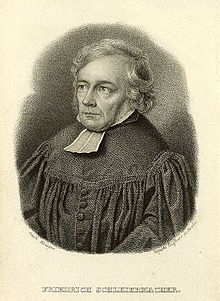Friedrich Schleiermacher | |
|---|---|
 | |
| Born | Friedrich Daniel Ernst Schleiermacher 21 November 1768 |
| Died | 12 February 1834 (aged 65) |
| Alma mater | University of Halle (1787–90)[8] |
| Era | 18th-/19th-century philosophy |
| Region | Western philosophy |
| School | German Idealism[1] Jena Romanticism[2] Berlin Romanticism[3] Romantic hermeneutics[4] Methodological hermeneutics[5] |
| Institutions | University of Halle (1804–07) University of Berlin (1810–34) |
| Notable students | August Böckh Friedrich Adolf Trendelenburg |
Main interests | Theology, psychology, New Testament exegesis, ethics (both philosophic and Christian), dogmatic and practical theology, dialectics (logic and metaphysics), politics[6] |
Notable ideas | Hermeneutics as a cyclical process[7] Socratic problem |
| Part of a series on |
| Reformed Christianity |
|---|
 |
|
|
Friedrich Daniel Ernst Schleiermacher (German: [ˈfʁiːdʁɪç ˈʃlaɪɐˌmaxɐ]; 21 November 1768 – 12 February 1834) was a German Reformed theologian, philosopher, and biblical scholar known for his attempt to reconcile the criticisms of the Enlightenment with traditional Protestant Christianity. He also became influential in the evolution of higher criticism, and his work forms part of the foundation of the modern field of hermeneutics. Because of his profound effect on subsequent Christian thought, he is often called the "Father of Modern Liberal Theology" and is considered an early leader in liberal Christianity. The neo-orthodoxy movement of the twentieth century, typically (though not without challenge) seen to be spearheaded by Karl Barth, was in many ways an attempt to challenge his influence. As a philosopher he was a leader of German Romanticism. Schleiermacher is considered the most important Protestant theologian between John Calvin and Karl Barth.
- ^ Kristin Gjesdal, Gadamer and the Legacy of German Idealism, Cambridge University Press, 2012, p. 156.
- ^ Paola Mayer, Jena Romanticism and Its Appropriation of Jakob Böhme, McGill-Queen's University Press, 1999, p. 101.
- ^ Helmut Thielicke, Modern Faith and Thought, William B. Eerdmans Publishing, 1990, p. 174.
- ^ Kurt Mueller-Vollmer (ed.), The Hermeneutics Reader, Continuum, 1988, p. 72.
- ^ Edward Joseph Echeverria, Criticism and Commitment: Major Themes in Contemporary "Post-Critical" Philosophy, Rodopi, 1981, p. 221.
- ^ Cite error: The named reference
EB1911was invoked but never defined (see the help page). - ^ Friedrich Schleiermacher, Hermeneutics: The Handwritten Manuscripts, ed. by Heinz Kimmerle, trans. by James Duke and Jack Forstman (Missoula: Scholars Press, 1977), p. 196: "just as the whole is understood from the parts, so the parts can be understood from the whole. This principle is of such consequence for hermeneutics and so incontestable that one cannot even begin to interpret without using it."
- ^ Biografie, Friedrich Schleiermacher